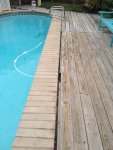Hey gang,
I am, in the near future, planning on replacing my pool's decking. The pool is an older inground pool that currently has a wood deck. It appears that in the past in may have had a concrete deck, which was torn out and replaced with the wood decking. The wood decking is very aged and becoming dangerous to walk on. It is time to replace it.
I enjoy DIY projects, but frequently travel so I will not have time to finish the project in one sweep. My plan is to purchase a small concrete mixer and knock out pieces of the deck in time-managed "chunks."
1. Is pouring the deck at various intervals doable? Will spreading this out over time somehow hurt the integrity of the deck?
2. What is the min/max recommended distance for expansion joints - this is how I will plan each pour.
3. What are some best practices for creating the deck form - how deep, (south Texas - clay soil)
4. Rebar, wire mesh, etc.
5. What goes between the existing coping and the concrete deck?
Sorry, a lot of questions, but I would like to do this right.
BTW - I was able to fix some other pool related problems with TFP's help and I also now save myself $150.00/month by using TPFs methods (I fired the pool guy - he couldn't keep the pool blue). For the past 6 months my pool has looked INCREDIBLE, now costs me about $50 per month, and doesn't really take that much effort. Not to mention, I've taught my daughters some chemistry - they test the water's chemistry.
Thanks.
Scott
I am, in the near future, planning on replacing my pool's decking. The pool is an older inground pool that currently has a wood deck. It appears that in the past in may have had a concrete deck, which was torn out and replaced with the wood decking. The wood decking is very aged and becoming dangerous to walk on. It is time to replace it.
I enjoy DIY projects, but frequently travel so I will not have time to finish the project in one sweep. My plan is to purchase a small concrete mixer and knock out pieces of the deck in time-managed "chunks."
1. Is pouring the deck at various intervals doable? Will spreading this out over time somehow hurt the integrity of the deck?
2. What is the min/max recommended distance for expansion joints - this is how I will plan each pour.
3. What are some best practices for creating the deck form - how deep, (south Texas - clay soil)
4. Rebar, wire mesh, etc.
5. What goes between the existing coping and the concrete deck?
Sorry, a lot of questions, but I would like to do this right.
BTW - I was able to fix some other pool related problems with TFP's help and I also now save myself $150.00/month by using TPFs methods (I fired the pool guy - he couldn't keep the pool blue). For the past 6 months my pool has looked INCREDIBLE, now costs me about $50 per month, and doesn't really take that much effort. Not to mention, I've taught my daughters some chemistry - they test the water's chemistry.
Thanks.
Scott



